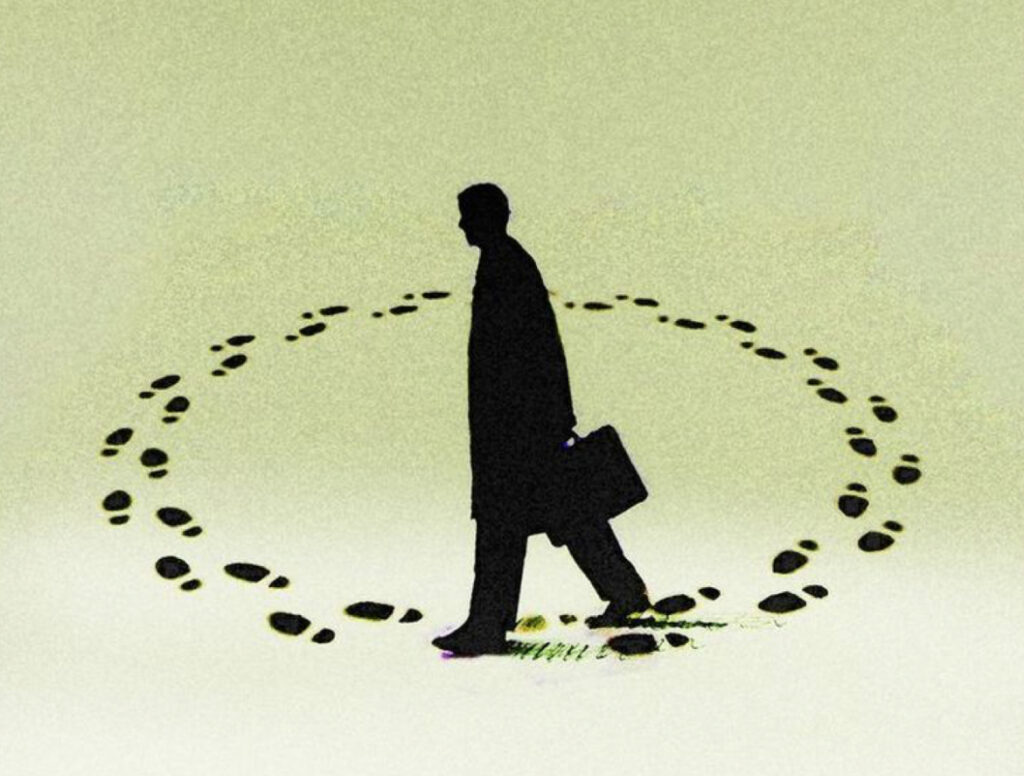Sisyphus, the myth and the absurdity of life

Mythical stories and fables that are weaved from the fabric of life have enchanted humans since the dawn of civilization. For a myth to endure a time-spanning across generations and people identifying with them for its symbolic belief signifies its credibility.
Sisyphus myth is one among many that have been reviewed widely in association to work, attitude and in the realm of existentialism.
A one-line description of Sisyphus myth can be a man’s perseverance in a senseless repetition of a futile pursuit.
A commoner might remember Sisyphus’ experience as a person who is toiling in vain.
Sisyphus, the mythological character
Sisyphus, a character from Greek mythology, is personified as a cunning, clever and deceitful man who chose to fight with Gods, outwitting death twice, thereby infuriating the divinities.

Guilty of having offended the Gods twice, he is brought to the underworld, where he is condemned to roll a huge boulder to the top of a mountain. However, the boulder continues to fall back down before ever reaching the top, forcing Sisyphus to move it for all eternity.
How the modern world perceive it
The contemporary society might understand this myth with different opinions, based upon their perception and experiences.
For the young, it symbolises frustrating, strenuous work that achieves nothing.
For a homemaker, it’s the endless repetition of housekeeping, washing, cooking and cleaning up or dealing with the same recurring problem in relationships.
For some, it represents the hardship of enduring one’s own troublesome side but without triumph.
Older age perceive this theme in conjunction with battling illnesses and death.
Few observed the positive aspect of order in the repetition and the sense of security it brings.
Ultimately, it symbolises a difficult task, causing suffering, or a mundane everyday repetition that needs to be carried out eternally.
But most of them speak of Sisyphus in the context of working, so it’s even known as Sisyphus work. Deeper Reflections
If one prefers to reflect deeply into the meaning of the myth, you can observe the extreme hardship, the necessity of letting go and the determination to start anew despite knowing that the efforts would fail in the end.
It is a struggle that is undertaken alone, with no onlookers to appreciate or support the turmoil. It is a myth that deals with a meaningless pursuit, but the protagonist cannot give up anytime soon.
A metaphor for life and work
Sisyphus has been used as a metaphor by philosophers and writers to represent the mechanical, absurd rhythm of human existence.
Stone could symbolise all hardships men have to overcome in life, one after another. Pushing the stone is akin to fulfilling responsibility and duties in life, the unmovable burden that does nothing but weighs you down.
Life invariably gets intertwined with tasks that repeat themselves with monotonous uniformity, like moving the boulder up and letting it go. Everything flows or goes on as long as we live.
At times, despite all the efforts, nothing can be brought to a satisfactory end with meaning in human life as the fruitless effort of Sisyphus.
Man’s date with reality
One day, amid life, the man stumbles upon the reality of his own fragility, isolation, alienation and finiteness; the urgency of death and nothingness suddenly flashes through the mind.

Mulling over the question of the absurdity of life, he passively accepts the fact that no human activity is meant for eternity and about the impermanence of life.
Nevertheless, there is a demand for clarity that man desires in his relationship with the world, and he starts contemplating whether life is worth living or not.
Why do few people resign and others persevere at the meaninglessness and absurdity of life when dealing with eternal responsibility?
As per the existential philosophers, mid-life is a stage when people become acutely aware of the theme of existentialism.
Midlife disillusionment
Midlife is a time in which we must bid farewell to much of what was valued before, to our idea of greatness, ethics and expectations from life.
The collision of the impossible with the possible has shown us our limits, that we are not invincible as we thought of ourselves to be.
Experiences at this point are more existential, and their problems can neither be avoided nor denied as in a younger age. Much of life repeat; we get a feeling that we’ve seen and done this before.
Witnessing the repetition of beautiful and painful events in the previous and forthcoming generations, one identifies the pattern of longing, hopes, needs and dispute repeating themselves eternally. So it is a stage of life to accept the necessity of repetition, even one wishes life must change, that not everything can be productive, but one has to live with the same old tune.
Or it could be a stage in life where man is all consumed by the never-ending demands of work with no energy left for anything else. Also learned a lot about mastering life and have grown accustomed to ourselves and our abilities or the lack thereof.
The disillusionment of middle age is felt like a jolt to many. Existentialism represented by Sisyphus has valuable insights to offer to man relating to work or life itself.
Existentialism
Philosophers, famous literary laureates, religious teachers and modern world psychologists have developed various theories and modalities in dealing with existentialism. The domain is vast, deep, like an ocean with unlimited insights and explanations.
The myth of Sisyphus by Albert Camus
With my limited knowledge, let me outline the Sisyphus myth with existentialism, as depicted in the book The myth of Sisyphus authored by Albert Camus, a widely read and debated article.
Albert Camus’s statement had gained the world’s attention when he said,
But one day, the why arises, and everything begins in that weariness tinged with amazement.
A whole new Sisyphus
As a humanist author, Camus tried to change the way we perceive Sisyphus.

Camus portrays Sisyphus as the embodiment of a courageous hero who copes with the hardship without fleeing. By doing so, Sisyphus takes his fate into his own hands and thus refuses to be defeated by the Gods. He lives in the here and now with no anticipation of reward or expectations and refuses to wither away.
Sisyphus is the modern world’s poster boy for the theme of “forever starting again from the beginning and never really giving up.”
The author emphasises the philosophical reflections on giving up on life versus engagement with a hopelessly frustrating world and shows that no one should give up on their life in the face of the absurdity of life.
Is Sisyphus a happy person?
Camus sees Sisyphus as a happy person because he rebels against divine laws and takes responsibility for his actions. He is no longer condemned to carry the rock to the top of the mountain but chose this as his destiny, thereby becoming master of his destiny.
Camus advises men to learn to live with the absurd because it can lead them to happiness.
The strength and weakness of this philosophy
No one can agree entirely with the Camus image of Sisyphus.
The positive attributes one can learn from Camus perspective are the attitude of never giving up, exerting to one’s limit, shouldering the responsibility even without the prospect of success, and having the courage to face disappointments and emotional hurt. He also gives humans the motivation to start over again.
There are periods in every person’s life during which one has to adopt this attitude to survive. Defiance is, after all, an important source of strength.
Criticism of the composition
Since The myth of Sisyphus was published, it has been debated and critiqued by philosophers and writers worldwide. Few points they have argued against the theme, which are meaningful and open up new possibilities, are discussed below.
According to them, an essential part missing from this theme is ignoring the importance of cultivating relationships.
Meaningful relationships are undoubtedly the backbone of any individual or society, and they are the powerful support system in overcoming any hurdles in life, existentialism or not.
The joy of existence lies in our relationships, but Camus never mentioned its significance.
Another exciting opinion was that holding on and letting go are two sides of the same coin, and it may even be time to let go of the stone for good and do something different which will be meaningful to us for the remainder of our lives. So letting go is never going to be a bad option after all.
Camus painting of Sisyphus as a happy man is something that is disagreed by many. Who can endure an eternal repetition without hope and be satisfied with it?
Also, Sisyphus behaviour is inappropriate for most circumstances but can be applied in the specific life situation only.
The courage to begin anew and bear the losses can be a misguided choice and a compulsion to repeat. So knowing when to give up is an essential part of learning.
Moreover, the theme fails to indicate when it is sensible to consent to defeat and how long it is reasonable to keep fighting against the passing of time.
If we never accept defeat, then like the unwilling hero, we must always exert against the boulder up the mountain. Thus we overreach or even handicap ourselves with expectations.
Last but not least is the significance of religious beliefs and practices in our lives, which are indeed the only hope that keeps us afloat during times of crisis. Camus never mentioned the role of faith. Maybe rational thinking promoted by science and emerging atheism during that period kept him reserved from the subject.
Sisyphus like suffering
The relevance of an age-old myth in modern periods is that we live in a world that’s plagued by Sisyphus-like suffering. Pursuing our dreams has led us to live the life of Sisyphus. We get to see Sisyphean sufferers among us more than ever.

Do those who strive to succeed with obstinacy despite their hopeless goals can identify with Sisyphus?
Or those who are trying to stretch themselves beyond reasonable limits are pursuing a Sisyphean struggle?
Those who overestimate themselves and their abilities trying to prove them superior to God or embodying God-like attitude are entrapped in this suffering forever?
Those who are reluctant to step back but try to prove to themselves that they can still do it may be a modern era Sisyphean.
In a society that places high values on achievements and power, pushing everyone to partake in the rat race, undermining the importance of relationships are doomed to lead a meaningless Sisyphean pursuit.
Absurdity called life
We live in a meaningless world indifferent to our suffering, but one must persevere in our pursuit of whatever must be done. Winning and losing are equally important aspects of life. So more is in the journey rather than in the goal.
The idea of life is having to sustain the effort while at the same time having to let go repeatedly is something everyone needs to adopt.
Acknowledge that our abilities have limits. Being ordinary is not a limitation; it opens up a great many ordinary possibilities in life.
In realisation of the absurdity of life, man experiences true freedom.
Live in the moment
The present becomes the most critical time of all. Man must therefore compensate for this lack of future with the quality and quantity of his experience.

Man’s perseverance in a futile pursuit is testimony to his dignity. It is precisely in the meaningless of the world that the meaning of our existence can be found.
Dear soul, yearn not
for eternal life,
but fully embrace the possible
– Pindar





In the end,the purpose of life is there is no purpose.To experience everything life has to offer,the good and the bad.
The now is all we ever will have ♾
To be timeless and still just like the cosmos
An infinite blanket of emptiness??
Wow Appu! Excellent observations, and I’m happy someone read the article and got the gist of the whole thing?